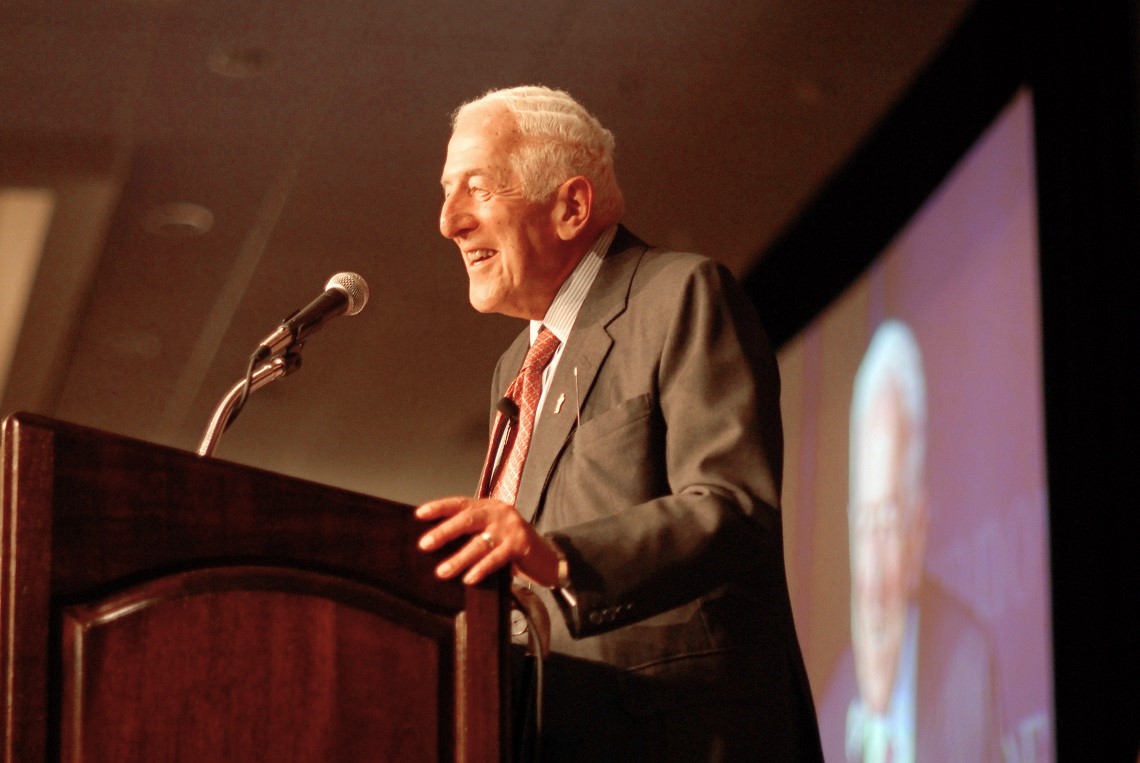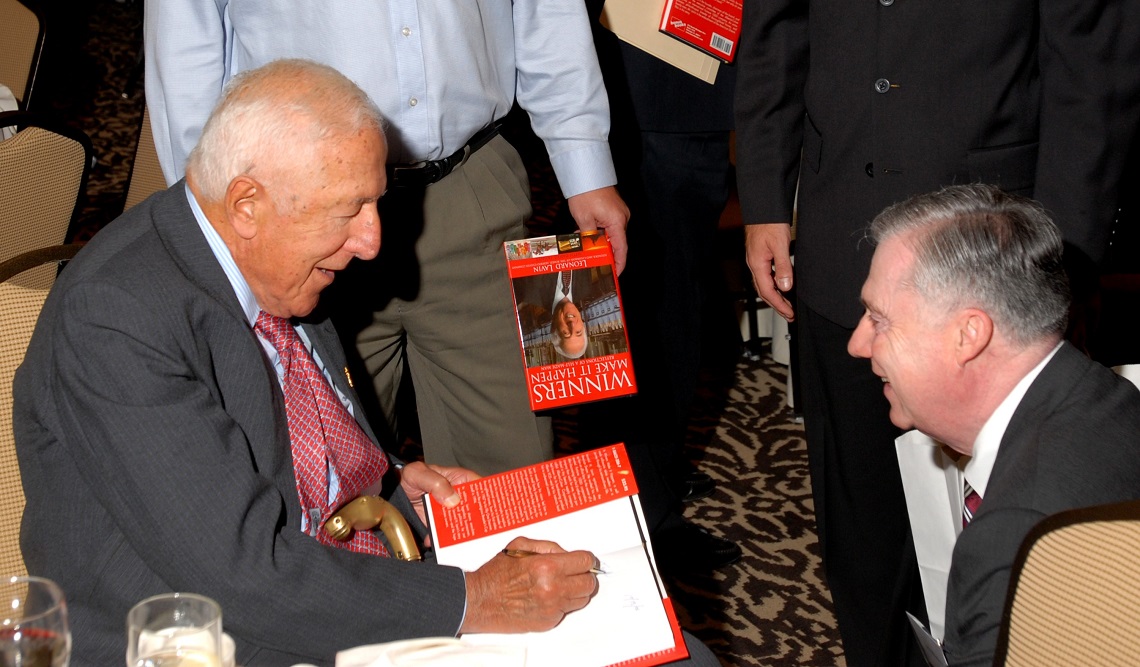Golden Age Entrepreneur
Leonard Lavin, the founder Foster’s Lavin Entrepreneurship Program, built an empire around innovative personal care products
“I was born on October 29th, 1919, and for my tenth birthday the stock market crashed.”
The opening line of “Winners Make It Happen,” the autobiography of Alberto-Culver Company founder Leonard Lavin (MBA 2001, honorary), does more than frame a colorful history from the “Greatest Generation.” It also introduces the secret to his remarkable success at marketing personal care and beauty products over five decades, which had everything to do with his response to hard times and other challenges.
Lavin grew up in Chicago during the Great Depression. His father was the kind of scrappy serial entrepreneur whose ventures generated more entertaining stories than money. A basketball scholarship allowed Lavin to study business at the University of Washington in the late 1930s. But weeks shy of graduation, he returned home when his father became ill. “If your family can’t get enough to eat, you don’t look back,” he says. “You do what you have to do.”
 Lavin did what he had to do until one day, waiting for a bus in front of a Walgreens in downtown Chicago, he found what he wanted to do. For some reason that day, he took an interest in the window display. “I don’t know whether it was an accident or designed by fate,” he says, “but I turned around and saw this window with ladies’ cosmetic products. I walked into the drug store, went to the phone booth, opened up the yellow pages to ‘cosmetics and toiletries,’ and saw a company with the same initials as mine.”
Lavin did what he had to do until one day, waiting for a bus in front of a Walgreens in downtown Chicago, he found what he wanted to do. For some reason that day, he took an interest in the window display. “I don’t know whether it was an accident or designed by fate,” he says, “but I turned around and saw this window with ladies’ cosmetic products. I walked into the drug store, went to the phone booth, opened up the yellow pages to ‘cosmetics and toiletries,’ and saw a company with the same initials as mine.”
That was Lucien Lelong. Its offices were a few blocks away. Lavin walked straight there and talked his way into a job.
“I thought to myself, no matter what’s going on in the rest of the world—the Depression, the war in Europe—American women will find a way to scrape some pennies together to buy these products and make themselves look nice,” he says.
But the war interrupted. Lavin enlisted in the Navy, served in nine invasions in the South Pacific and survived a direct hit by a Japanese kamikaze pilot.
Postwar life brought opportunity and adventure. Lavin returned to Lucien Lelong and quickly worked his way into sales. Then he became national sales manager for a small home-permanent company called Beauty Wave, and canvassed the country, building a vast network of store owners and floor managers. Denied an equity stake in Beauty Wave, he launched the Leonard H. Lavin Sales Company and sold cosmetics, personal care products, even toys to a national market.
The quintessential sales and marketing man, Lavin also was ever-vigilant for the next potential blockbuster product. In the mid-1950s he heard of a salon brand of hair conditioning called “Alberto VO5,” that was a favorite of Hollywood glitterati because it kept hair healthy and shiny even after hours under studio lights. Nobody else even knew about it.

They do now. Lavin bought the company and began to build it. He needed a partner to handle operations and finances, so he wooed his wife, Bernice, away from her own plum position as controller of an auto industry supplier.
Mom and Pop began winning shelf space over bigger, better-financed brands from Revlon and Clairol, and eventually consumer goods giants like Procter & Gamble and Colgate-Palmolive. The Lavins did it on the national sales network Leonard had built, and via a new medium that proved to be the great equalizer.
Lavin first stepped into the neo-natal world of television in 1950, advertising Stopette, the first spray antiperspirant, on professional wrestling programs. Later, Alberto VO5 sponsored “What’s My Line?” and “The Smothers Brothers Show.” “I didn’t feel I could compete on a national scale by the conventional business model,” he says. “When I first saw TV, I thought, boy, if we can demonstrate the reason why my products are better than the competitors… It was just common sense.”
Lavin pioneered production of demonstrative commercial spots for his growing line of brands. And as television advertising grew ever more expensive in the 1960s, he fought for the 30- and 15-second spots that have become the industry standard.
Lavin expanded Alberto-Culver through acquisitions and new product launches, building a portfolio of beauty, personal care and household brands that is today a publicly traded $1.4 billion company selling in 120 countries. In 1993, Lavin was inducted into the Merchandising Executives Club Hall of Fame.

Though the Lavins no longer run day-to-day operations at Alberto-Culver (their daughter, Carol Lavin Bernick is executive chairman), Leonard continues to serve as director and chairman emeritus. In “retirement,” he’s entrepreneur-in-residence at San Diego State University. He also breeds and races thoroughbred horses out of the family’s Glen Hill Farm in Ocala, Fla. His lifelong passion for the sport began when Lavin attended the 1928 Kentucky Derby, the first of many afternoons at the track with his father.
Lavin is also a noted philanthropist and benefactor of the Lavin Family Foundation. In 2006 he donated $2 million to the Foster School of Business to establish the Leonard and Bernice Lavin Entrepreneurial Action Program (LEAP) within the Center for Innovation and Entrepreneurship. Beginning this fall, the program will provide 25 student entrepreneurs direct access to mentors from the business community and superb networking opportunities.
“More than any other question I am asked, people want to know if we could do now what we did starting in the mid-1950s in terms of building a great company,” Lavin says. “I’d certainly like to think we could, and I think it is essential for the future competitiveness of America for individuals with dreams and ideas to be able to turn those into successful businesses. We want to help give others a chance to realize the success Bernice and I have enjoyed.”
